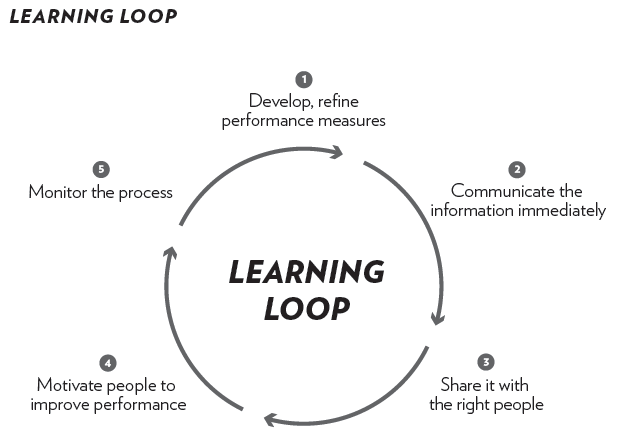To accelerate the pace of change, leaders must focus on creating localized systems of learning. It sounds easy, but it’s not. The secret is what I call “learning loops.” Learning loops are similar to feedback loops except they are deliberately designed to involve a small group of people who are empowered to achieve organizational change at maximum speed.

Learning loops have three critical elements:
- They are based on near real-time measures of performance. Examples might be cycle time or product quality or customer satisfaction.
- Immediate communication occurs with people who are empowered to make change happen. People need to be clearly empowered by management to make decisions. They need to trust that the learning loop is intended to result in innovation and change, not mere talk. There also needs to be tolerance for failure. The executive of a bank purposefully invokes a “no reprisals” rule at the start of every learning loop meeting. He says: “There will be no reprisals for anything we decide in this room, so long as it is stated with the interest of the company at heart.”
- Real change needs to occur as a result of the learning loops. It’s not enough to generate ideas. Senior management must support and implement innovations that flower from the learning loop forums. Those innovations need to be tracked to determine whether they are successful and, if so, that success needs to be communicated across the organization.
As people begin to trust that the intent is not to penalize but to learn and adapt, they start to experience the power of learning loops and see real improvement. Often it begins with a comparison of performance across teams.
Ten Questions To Ask As You Build Learning Loops:
- Do we have a team in place to make decisions?
- Are we getting the information in their hands quickly?
- Is the team truly empowered to act on the information?
- Are tough questions being asked?
- Are we identifying any barriers to implementation?
- Are the right managers championing the process?
- What are we doing about managers who resist the process?
- Do we regularly check to see if our learning loops are working?
- Are we translating our increased learning into increased performance?
- Are we learning as fast as we could? What could we do to accelerate the pace of change?
Learn more about using learning loops to accelerate change in my new book, The Leadership Equation: 10 Practices That Build Trust, Spark Innovation, and Create High-Performing Organizations.
LRI organizational development consulting combines the best OD practices with expert facilitation to help guide organizations through processes that result in meaningful change.